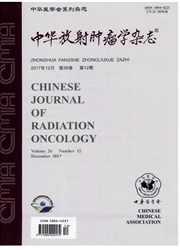

 中文摘要:
中文摘要:
目的 评估WBRT对肺癌脑转移患者认知功能及生活质量的影响.方法 以2015年收治的41例行WBRT的肺癌脑转移患者为研究对象,以蒙特利尔认知评估量表(MoCA)、简易精神状态量表(MMSE)为认知评估工具,以阿尔茨海默病协作研究日常能力量表(ADCS-ADL)为生活质量评估工具.独立样本t检验WBRT前后认知功能和生活质量水平.结果 WBRT前与后经MoCA、MMSE评估认知功能障碍比例分别为96.55%、48.28%和94.29%、31.43%.WBRT前与后相比MoCA、MMSE各量表总分分别为18.24±0.95与19.37±0.70(P=0.341),23.51±0.88与24.54±0.71(P=0.375).WBRT前与后ADCS-ADL得分分别为57.44±2.59、59.37±2.27(P=0.583).结论 WBRT对肺癌脑转移患者总体认知功能及日常生活质量水平无明显影响.MoCA对脑转移癌患者认知功能障碍筛查时较MMSE具有更高敏感性.
 英文摘要:
英文摘要:
Objective To evaluate the effects of whole brain radiotherapy ( WBRT ) on cognitive function and quality of life ( QOL) in patients with brain metastases from lung cancer. Methods A total of 41 patients with brain metastases from lung cancer who were admitted to our hospital and treated with WBRT in 2015 were enrolled as subjects. Montreal Cognitive Assessment ( MoCA ) and Mini-Mental State Examination ( MMSE ) were used for cognitive evaluation. The Alzheimer′s Disease Cooperative Study Activity of Daily Living ( ADCS-ADL ) scale was used for evaluation of QOL. Comparison of cognitive function and QOL before and after WBRT was made by the independent sample t-test. Results The incidence rates of cognitive dysfunction based on MoCA and MMSE were 96. 55% and 48. 28% before WBRT, and 94. 29% and 31. 43% after WBRT, respectively. There were no significant changes in MoCA score, MMSE score, or ADCS-ADL score after WBRT ( 18.24± 0. 95 vs. 19.37± 0. 70, P=0. 341;23.51± 0. 88 vs. 24.54±0. 71,P=0. 375;57.44±2. 59 vs. 59.37±2. 27,P=0. 583). Conclusions WBRT has no significant impacts on cognitive function and QOL in patients with brain metastases from lung cancer. MoCA is more sensitive than MMSE in detection of cognitive dysfunction in patients with brain metastases.
 同期刊论文项目
同期刊论文项目
 同项目期刊论文
同项目期刊论文
 期刊信息
期刊信息
